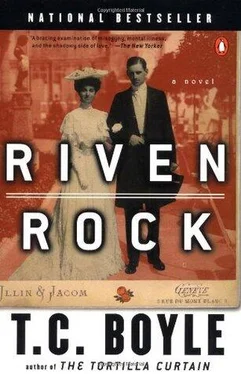T. Boyle - Riven Rock
Здесь есть возможность читать онлайн «T. Boyle - Riven Rock» весь текст электронной книги совершенно бесплатно (целиком полную версию без сокращений). В некоторых случаях можно слушать аудио, скачать через торрент в формате fb2 и присутствует краткое содержание. Год выпуска: 1999, Издательство: Penguin Books, Жанр: Современная проза, на английском языке. Описание произведения, (предисловие) а так же отзывы посетителей доступны на портале библиотеки ЛибКат.
- Название:Riven Rock
- Автор:
- Издательство:Penguin Books
- Жанр:
- Год:1999
- ISBN:нет данных
- Рейтинг книги:5 / 5. Голосов: 1
-
Избранное:Добавить в избранное
- Отзывы:
-
Ваша оценка:
- 100
- 1
- 2
- 3
- 4
- 5
Riven Rock: краткое содержание, описание и аннотация
Предлагаем к чтению аннотацию, описание, краткое содержание или предисловие (зависит от того, что написал сам автор книги «Riven Rock»). Если вы не нашли необходимую информацию о книге — напишите в комментариях, мы постараемся отыскать её.
Riven Rock — читать онлайн бесплатно полную книгу (весь текст) целиком
Ниже представлен текст книги, разбитый по страницам. Система сохранения места последней прочитанной страницы, позволяет с удобством читать онлайн бесплатно книгу «Riven Rock», без необходимости каждый раз заново искать на чём Вы остановились. Поставьте закладку, и сможете в любой момент перейти на страницу, на которой закончили чтение.
Интервал:
Закладка:
“Are you catching a chill?” she asked, scrutinizing him with her ice-blue gaze.
“No,” he said.
“And you’re not eating — don’t tell me you’re not hungry after all that exercise?”
This was the time to tell her how he felt, this was the time for sweet talk, for lovers’ banter, the time to say, How can mere food hope to sustain me when I have the vision of you to feast on? but he didn’t tell her that, he couldn‘t, and he fiddled with his fork a minute before lifting his eyes to hers. “When the masses have enough on their plates,” he said, “when the tenements have been torn down and good decent housing erected in their stead and on every table a leg of lamb and mint jelly, then I’ll eat.”
Two days later, Katherine was gone. Her vacation was over, the new semester beginning, her thesis beckoning. Before she left, she gave him a blue bow tie and a box of maple sugar candy molded in the shapes of squirrels, rabbits and Scotch terriers, and he gave her a copy of the Debs pamphlet and a first edition of Frank Norris’s The Pit. He’d begged her to stay, prostrating himself at her feet, all wrought-up with speeches about conditions in the textile mills, settlement houses and the immigrant poor, but he never mentioned love — it wasn’t in his power — and she had to go, he understood that. Still, he was devastated, and no sooner had she boarded the train than he was off for Boston in the Mercedes. He packed hurriedly, with none of the indecision that had plagued him in recent years, and he brought Morris Johnston along with him, both as a sympathetic ear he could fill with praises of Katherine and as a buffer against any subversive lavatory mirrors that might spring up like windmills in his path.
On arriving, he took rooms at a hotel near Katherine’s mother’s place on Commonwealth Avenue and began his siege. He sent flowers daily, whole greenhouses full, and he called each evening on the stroke of seven, his palms sweating, heart thumping, eyes crawling in his head. The maid greeted him with a sentimental smile, and Mrs. Dexter, Katherine’s mother, beamed and prattled and plied him with an endless array of sweetmeats, sandwiches, fruits, nuts and beverages, while he sat awkwardly in the parlor and thought of Katherine dressing in the empyreal realms above him. And did Mr. McCormick appreciate how clever her daughter was? Mrs. Dexter wanted to know. She’d tried to discourage her with this scientific business from the beginning, heaven knew, because science just wasn’t a lady’s provenance, or hadn’t been, until Katherine came along to tackle it with her keen intellect and persevering nature, but now she had to admit that her daughter couldn’t have made her prouder, and would he like another chocolate?
And Katherine. She was receptive, very sweet and encouraging, a paragon, especially during his first few visits, and that made him soar with a kind of elation he’d never known, but by the end of the week she’d begun to beg off on account of her studies and he found himself spending more and more time with Mrs. Dexter, a teacup balanced on one knee and a plate of sandwiches on the other. She had to study, of course she did — she was a brainy intellectual young woman and she’d been working eight years for this — but still it threw him into a panic. What if she were using her studies as an excuse, a way to get rid of him early so she could slip out at nine or ten and flit around with Butler Ames, whom he’d already encountered twice on her very doorstep? He was beside himself. He couldn’t eat. Couldn’t sleep. And he didn’t dare look in the mirror.
But on Friday she consented to go to dinner and the theater with him, and he took her and her mother to dine at his hotel and then to a very amusing production of The Importance of Being Earnest. At least Stanley found it amusing, and Katherine seemed to enjoy herself too, laughing in all the right places, but he worried that it might be too frivolous for her, not enough concerned with the pressing issues of the day, and when they got back to her place he started in on Debs again, by way of compensation. “Do you know what Debs says?” he began as Mrs. Dexter made a discreet exit and the maid set down a plate of poppy seed cakes and vanished.
Katherine sat across from him, in an armchair. Outside, it was raining, the streets shining with it, the sound of the horses’ hoofs magnified in the steadily leaking night air. You could hear them — clop, clop, clop — and that was all, but for the hiss of the rain and the ticking of the clock on the mantelpiece. “No,” she sighed, tucking her feet up under her skirts and settling into the chair. “I don’t really know.”
“ ‘The few who own the machines do not use them,’ ” Stanley quoted, leaning forward with a sage look. “ ‘The many who use them do not own them. ’ You see? Simple, direct, brilliant. And of course the result is the sort of inequity you and I see and abhor every day but that the rest of the world seems to turn its back on. He wants national laws to protect workers against accidents on the job, unemployment and old age insurance programs, public works for the unemployed — and until workers take over the means of production, a decrease in the work hours as production increases—”
She didn’t seem to be listening. She was stirring a cup of tea with a demitasse spoon, her eyes unfocused and vague.
“He says,” Stanley went on, “he says—”
“Stanley?”
“I — um — yes?”
“Please don’t take this the wrong way, but while I admire your commitment to the progressive causes, I really do, don’t you ever stop to wonder why you seem, well, so obsessed with them?”
“Me? Obsessed?”
She laughed then, and he didn’t know whether to laugh with her or to bristle because she might have meant it as a barb, the tiniest dart that would tear his flesh open, a wound that would grow wider and wider till there was room enough for all the Butler Ameses of the world to march right on through him. His face was blank. He reached for a poppy seed cake and got it halfway to his mouth before he thought better of it and set it back carefully on the plate.
“Could it be a defensive reaction, do you think? I mean, because you and I have so much in contrast to the poor?”
“Well — I — yes. Yes, of course. My father, you see, he’s the one. He wouldn’t allow a union in his shop, the Haymarket Riots, all that, and it’s not right, it’s not. My father—” he said, and he found he couldn’t quite organize his thoughts beyond that, because his head was suddenly filled with the image of that cranky imperious old man with his jabbing rapier of a beard, filling the halls of the house with his roars and his bile and his unloving fierce stifling presence. “My father—” he repeated.
Katherine’s voice was very soft, so soft he had to. strain to hear it over the noise of the rain, the plodding horses, the ticking of the clock that rose suddenly in volume till it was like a whole symphony of clocks all beating time in unison, tearing away at the hours, the minutes, the seconds he had left before she got up and dismissed him. “I know it must be hard,” she said, “but you have to put it behind you. And as admirable as progressive reform may be, there are other things in life — music, painting, all the arts — and when a man and woman are alone together, when they’re as intimate as you and I are now, don’t you think there are more appropriate things to talk about?”
“Well, yes,” he said, but he didn’t have a clue.
Another sigh. “Oh, Stanley, I don’t know about you. You’re very sweet, but really, you do have a lot to learn about the art of wooing.” And then she stood and the maid was there and the evening was over.
Читать дальшеИнтервал:
Закладка:
Похожие книги на «Riven Rock»
Представляем Вашему вниманию похожие книги на «Riven Rock» списком для выбора. Мы отобрали схожую по названию и смыслу литературу в надежде предоставить читателям больше вариантов отыскать новые, интересные, ещё непрочитанные произведения.
Обсуждение, отзывы о книге «Riven Rock» и просто собственные мнения читателей. Оставьте ваши комментарии, напишите, что Вы думаете о произведении, его смысле или главных героях. Укажите что конкретно понравилось, а что нет, и почему Вы так считаете.












